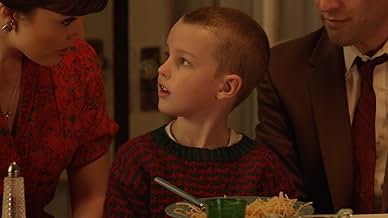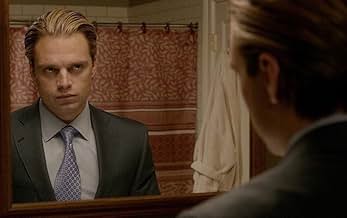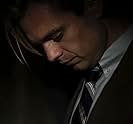NOTE IMDb
5,6/10
1,9 k
MA NOTE
L'approvisionnement alimentaire d'un homme est faible et il n'y a pas d'électricité. Alors ses sombres pensées envahissent son esprit.L'approvisionnement alimentaire d'un homme est faible et il n'y a pas d'électricité. Alors ses sombres pensées envahissent son esprit.L'approvisionnement alimentaire d'un homme est faible et il n'y a pas d'électricité. Alors ses sombres pensées envahissent son esprit.
- Réalisation
- Scénario
- Casting principal
- Récompenses
- 5 nominations au total
Avis à la une
Greetings again from the darkness. So many are haunted by the past - unable to move beyond either having been dealt a bad hand or having created one through their own actions. The film opens on a gaunt Steve (JK Simmons), alone in his apartment, and seemingly barely functioning. He is contemplating suicide with a shiny gun he keeps on a coffee table in a home as unkempt as himself. His only breaks are to frantically search the house for another bottle of vodka, or to listen to a phone message that kicks off yet another painful memory.
The film features three timelines for Steve: the despondent, suicidal elder; the twenties and thirties version (Sebastian Stan); and the 1960's childhood Stevie (Iain Armitage, "Young Sheldon"). Those young years for Stevie recall his always-annoyed mom (Mandy Moore) and his fun-loving dad (Max Greenfield), while the young adult years show us his romance and marriage with Karen (Maika Monroe). It's not long before we recognize the common thread that binds the timelines: alcoholism. First his dad's, then his own.
Our memories tend to return in moments and flashes of events. This becomes more evident and the memories less reliable when years of alcohol abuse are in play. The flashes include the courtroom and judge of his parents' divorce, his dad drinking, his own courting of Karen and the booze that accompanied it, the dissolution of his own marriage, and an unspeakable tragedy that ruined his life without taking it ... something he is looking to remedy with that gun.
JK Simmons is remarkable here. His Steve is mired in loneliness, depression, guilt, and regrets - each amplified through booze. Simmons' performance offers up not a single line of dialogue. He never leaves the apartment. He never has human interaction. Yet despite all of this, he never leaves our thoughts as he pinballs through his memories. Mr. Stan and Ms. Monroe provide the most telling scene outside of Simmons' segments. Notice the difference in demeanor as he tells her he heard the shot when his dad killed himself vs how she states her mother died from cancer. This is the contrast of moving on no matter what life serves up, or being burdened with that weight forever.
The film was directed by Mr. Simmons' wife Michelle Schumacher, and she co-wrote the screenplay with Tony Cummings (son of Emmy winning actor Robert Cummings). Mr. Cummings also appears as the judge in the divorce hearing. The film was originally shown in 2017, but is only now getting released. For fans of JK Simmons, it's a must see.
The film features three timelines for Steve: the despondent, suicidal elder; the twenties and thirties version (Sebastian Stan); and the 1960's childhood Stevie (Iain Armitage, "Young Sheldon"). Those young years for Stevie recall his always-annoyed mom (Mandy Moore) and his fun-loving dad (Max Greenfield), while the young adult years show us his romance and marriage with Karen (Maika Monroe). It's not long before we recognize the common thread that binds the timelines: alcoholism. First his dad's, then his own.
Our memories tend to return in moments and flashes of events. This becomes more evident and the memories less reliable when years of alcohol abuse are in play. The flashes include the courtroom and judge of his parents' divorce, his dad drinking, his own courting of Karen and the booze that accompanied it, the dissolution of his own marriage, and an unspeakable tragedy that ruined his life without taking it ... something he is looking to remedy with that gun.
JK Simmons is remarkable here. His Steve is mired in loneliness, depression, guilt, and regrets - each amplified through booze. Simmons' performance offers up not a single line of dialogue. He never leaves the apartment. He never has human interaction. Yet despite all of this, he never leaves our thoughts as he pinballs through his memories. Mr. Stan and Ms. Monroe provide the most telling scene outside of Simmons' segments. Notice the difference in demeanor as he tells her he heard the shot when his dad killed himself vs how she states her mother died from cancer. This is the contrast of moving on no matter what life serves up, or being burdened with that weight forever.
The film was directed by Mr. Simmons' wife Michelle Schumacher, and she co-wrote the screenplay with Tony Cummings (son of Emmy winning actor Robert Cummings). Mr. Cummings also appears as the judge in the divorce hearing. The film was originally shown in 2017, but is only now getting released. For fans of JK Simmons, it's a must see.
I'm Not Here is a somber, introspective drama that explores themes of grief, regret, and the passage of time. J. K. Simmons delivers a deeply emotional performance as a man haunted by his past, portraying pain and isolation with remarkable subtlety. The film's nonlinear storytelling, weaving between past and present, adds depth to the narrative but at times feels disjointed, making it difficult to fully connect with the characters.
The cinematography and atmosphere effectively enhance the film's melancholic tone, and there are moments of genuine emotional weight. However, the pacing can be slow, and some scenes feel repetitive, making it a film that requires patience. The story's message about personal responsibility and redemption is thought-provoking, yet the execution lacks the impact needed to make it truly memorable.
I'm Not Here is a film with strong performances and a heartfelt story, but it struggles with its structure and pacing. While it won't resonate with everyone, those who appreciate slow-burning character studies may find something meaningful in its quiet reflection on life's choices.
The cinematography and atmosphere effectively enhance the film's melancholic tone, and there are moments of genuine emotional weight. However, the pacing can be slow, and some scenes feel repetitive, making it a film that requires patience. The story's message about personal responsibility and redemption is thought-provoking, yet the execution lacks the impact needed to make it truly memorable.
I'm Not Here is a film with strong performances and a heartfelt story, but it struggles with its structure and pacing. While it won't resonate with everyone, those who appreciate slow-burning character studies may find something meaningful in its quiet reflection on life's choices.
This movie really touched me, it's very emotional though I think it's an unfinished work! This is very disappointing an hour and a quarter isn't enough :(
What I liked about this film: the acting was excellent, very evocative of the emotions of the situations being shown.
But I'm not sure what exactly happened in certain scenes. I guess we're supposed to assume the details don't really matter or that he's so drunk he can't remember or doesn't want to remember. The ending is what confused me the most. Was he imagining something that he wished had happened, or just felt better knowing that's what he would do if he could?
I suppose this film will appeal to people who had alcoholics in their family. I didn't, so unfortunately, it was a bit too confusing for me.
But I'm not sure what exactly happened in certain scenes. I guess we're supposed to assume the details don't really matter or that he's so drunk he can't remember or doesn't want to remember. The ending is what confused me the most. Was he imagining something that he wished had happened, or just felt better knowing that's what he would do if he could?
I suppose this film will appeal to people who had alcoholics in their family. I didn't, so unfortunately, it was a bit too confusing for me.
I'm Not Here is a movie that follows the lead character Steve throughout three time periods of his life in a journey through the affects that alcoholism has on a family and the alcoholic. JK Simmons plays the older version of Steve and gives a fantastic performance of an aging alcoholic without saying a single word in the entire movie. But his performance is also part of the movie's weaknesses. Too much time is spent of his older years where Sebastian Stan as a younger adult version and Ian Armitage as the child version of Steve carry the film. Seeing their interactions with his parents and later his wife and child carry the emotional weight of the film. It could have easily been a great picture if more was focused on those time periods. As the picture is, it still is a good film that makes you think of your choices throughout life.
Le saviez-vous
- AnecdotesJ.K. Simmons never says one word during the entire movie.
- Crédits fousThere is one more scene after the ending credits.
- ConnexionsReferenced in Late Night with Seth Meyers (2014)
- Bandes originalesNot Who We Were
Composed and Performed By Em Beihold
Meilleurs choix
Connectez-vous pour évaluer et suivre la liste de favoris afin de recevoir des recommandations personnalisées
- How long is I'm Not Here?Alimenté par Alexa
Détails
- Durée
- 1h 21min(81 min)
- Couleur
Contribuer à cette page
Suggérer une modification ou ajouter du contenu manquant




















